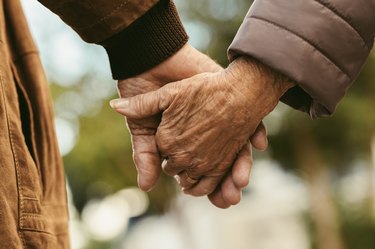
When it comes to healthy aging, if there's one takeaway you learn from Richard W. Besdine, MD, a professor of medicine at Brown University in Providence, Rhode Island, who's been a geriatrician for almost 50 years, let it be this: Let go of the habits that don't bring you joy (even if they're so-called healthy), and pursue the ones that do.
Although that path might look different for everyone, it can certainly help you age well — and it will also bring you fun while doing it.
Video of the Day
Video of the Day
"The domain of healthy living is popular, and there are experts emerging every day. I'm an expert who claims my expertise based on evidence," Dr. Besdine says. "This includes randomized trials when available, and if not, the best of observational data."
What's more: He's almost 81 years old, remarkably fit and at the top of his game professionally, to boot.
But he's not giving you the rules for how you should live. "My own behavior is unique to me. We are all special," he says. Meaning: What works for him might not be a fit for you. And that's OK.
Still, you can learn from his habits and take the overarching themes to look for ways to make adjustments in your own life. Here's what this aging expert does on the daily.
1. He Pursues His Passions
The problem with doing exercises other people tell you to do (or, indeed, eating foods people dub healthy) is that if you don't like them, you won't get the most from them.
"I have a squash addiction," Dr. Besdine says. (The racquet sport, not the vegetable.) "I would play squash if it were as bad for me as cigarette smoking, but thank goodness it isn't. This truth undermines experts who tell people what to do," he says.
He plays squash as often as his schedule allows, if he can find a partner to play with. If that's every day, then all the better.
Along with squash, he does two sessions with a personal trainer each week and he tries to get as many steps in as possible (though it's far less these days while working from home during the pandemic).
It's human nature to be active, and part of having an optimal lifestyle is participating in physical activity, Dr. Besdine says, though he acknowledges that there are many people who don't want to exercise. Not everyone will find a type of physical exercise that they truly love (as much as he loves squash). In that case, he suggests walking.
"If you can integrate 30 minutes [of walking] into your daily life, you will live longer and will be less likely to develop a raft of disease, including Alzheimer's," he says. (Indeed, merely upping your step count has been found to be protective for your brain, per a July 2019 paper in JAMA Neurology.)
Related Reading
2. He Eats Healthy Food He Enjoys

See a pattern here?
"I only eat food I really enjoy. It helps that my wife is a fabulous cook," Dr. Besdine says. "We are omnivores. We eat lots of fresh fruits and vegetables because they're delicious, and lots of olive oil because it's delicious."
On the other hand, he says he stays away from fried and fast foods because he doesn't feel great after eating them. (Hello, indigestion.)
Dr. Besdine also makes room for limited amounts of red meat.
"I cook rack of lamb once every six weeks," he says. "My wife loves a dry-aged sirloin, and she might have one every couple of months."
This is in line with a Mediterranean-style diet, which is heavily focused on fruits, vegetables and grains but also allows for the rare meal of red meat.
More often, though, dinner is a veggie pasta two or three nights per week. And there's lots of bread. Really, don't ever ask him to give up bread.
"Bread is how I get my olive oil. I drench it. And olive oil turns out to be one of the magic bullets," Dr. Besdine says.
Indeed, in a January 2019 study in the journal Foods, older adults who used only olive oil for cooking scored higher on a "successful aging index" compared to those who never used olive oil or used it along with other fats in cooking. It may be that olive oil's antioxidants are especially effective in quenching the free radicals that contribute to aging.
Related Reading
3. He Prioritizes Happy Relationships
Dr. Besdine happens to be happily married, something he credits with his overall health. That said, it's not about marriage per se, but about having a happy relationship with another human, he says: "Having multiple friendships has been proven in randomized trials to be good for you."
In a classic review published in July 2010 in PLOS Medicine, researcher Julianne Holt-Lunstad and her coauthors looked at nearly 150 studies and concluded that people who had stronger social relationships had a 50 percent increased likelihood of survival compared to people with weaker ties, an effect that is on par with quitting smoking and more impactful than other disease risk factors like being sedentary. Social support is associated with better immune functioning, for instance, the researchers noted.
4. He Doesn't Sleep on Stress
Everyone experiences stress — including Dr. Besdine.
"There's no doubt that stress can kill you. I'm respectful of stress," he says.
Meaning, when stress starts to creep up, he tries to do something about it (address the underlying problem, think about what he can control and act accordingly).
"There's a little evidence that stress is only bad for you if you're unable to do anything about it," he says. "I don't like to go to sleep on stress."
Find Stress-Relief Tactics That Work for You
- JAMA Neurology: “Associations of Physical Activity and B-Amyloid With Longitudinal Cognition and Neurodegeneration in Clinically Normal Older Adults”
- Foods: “The Effect of Exclusive Olive Oil Consumption on Successful Aging: A Combined Analysis of the ATTICA and MEDIS Epidemiological Studies”
- PLOS Medicine: “Social Relationships and Mortality Risk: A Meta-analytic Review”
Was this article helpful?
150 Characters Max
0/150
Thank you for sharing!
Thank you for your feedback!
Is this an emergency? If you are experiencing serious medical symptoms, please see the National Library of Medicine’s list of signs you need emergency medical attention or call 911.